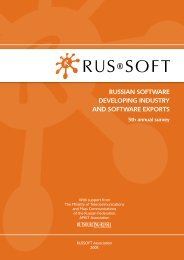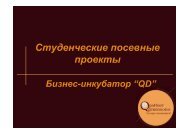russian software developing industry and software exports
russian software developing industry and software exports
russian software developing industry and software exports
You also want an ePaper? Increase the reach of your titles
YUMPU automatically turns print PDFs into web optimized ePapers that Google loves.
Chapter 1.<br />
Position of Russia in the Global Market of Software<br />
<strong>and</strong> Software Development Services<br />
(after the crisis began) <strong>and</strong> they are planning to<br />
provide services here (for instance, Finnish companies<br />
Forte Netservices <strong>and</strong> Elisa). Previously this market<br />
was also considered promising, because in the field<br />
of outsourcing Russia had a bigger lagging behind<br />
Western companies than in other areas.<br />
According to IDC, in 2007 Russian companies spent<br />
on IT outsourcing USD 532 mln, which makes 12.1%<br />
of total Russian market of IT services. In Western<br />
Europe this indicator makes around 20%, <strong>and</strong> in the<br />
USA – 40%. Gartner’s data state that IT outsourcing in<br />
Russia makes a little more than 10% of total volume of<br />
IT services. The nonprofit partnership Astra founded<br />
by major Russian IT services providers is planning<br />
to stimulate dem<strong>and</strong> in the market of outsourcing<br />
services.<br />
IT companies <strong>and</strong> analysts expect that in 2009 the<br />
share of the state would increase in the breakdown of<br />
costs. According to IDC, in 2008 state bodies spent on<br />
IT USD 2.96 bn with the volume of Russian IT market<br />
reaching around USD 24.6 bn. Therefore, the State<br />
covered 12% of total IT market.<br />
SOFTWARE MARKET<br />
Anti-piracy measures remain one of the key drivers<br />
for the growth of the Russian <strong>software</strong> market.<br />
According to the annual research of BSA <strong>and</strong> IDC,<br />
the volume of unlicensed <strong>software</strong> installed on<br />
computers in Russia in 2008 decreased by 5% against<br />
2007. The level of piracy in Russia reached 68%,<br />
<strong>and</strong> in 2004 – 87%. During these years this indicator<br />
increased from 38% to 41% in the world in general,<br />
<strong>and</strong> remained the same in the European Union – 35%.<br />
BSA <strong>and</strong> IDC take into account the total cost of<br />
<strong>software</strong> installed illegally. This does not mean that<br />
unauthorized <strong>software</strong> is actively used for its intended<br />
purpose according to its functionality. In many cases<br />
students <strong>and</strong> adolescents install it only to try a certain<br />
program. Commercial enterprises often install illegally<br />
(<strong>and</strong> therefore, free of charge) powerful <strong>and</strong> highpriced<br />
<strong>software</strong> despite being quite happy with the<br />
functionality of simple <strong>and</strong> inexpensive programs.<br />
Therefore, the real level of piracy in Russia, according<br />
to expert estimations, approximates 50%.<br />
There are reserves for the market growth owing<br />
to the anti-piracy campaign. They are predetermined<br />
by the current piracy level (quite high according to<br />
all estimates) <strong>and</strong> also by unmet needs. By the level<br />
of informatization Russia approaches the developed<br />
states, but still the difference is big.<br />
At the same time, analysts do not expect the<br />
Russian <strong>software</strong> market to grow in 2009. According<br />
to the IDC forecast, <strong>software</strong> sales will drop by<br />
30%. In 2007, this market increased by 40% <strong>and</strong><br />
totaled around USD 3.2 bn. In 2008, the growth was<br />
10.5%. The Mass Media published the estimates,<br />
performance results <strong>and</strong> forecasts of the leading IT<br />
companies. The revenue of a major Russian <strong>software</strong><br />
developer 1С increased only by 8% in 2008, though<br />
in 2007 its sales almost doubled (source: Vedomosti<br />
as of May 15, 2009). In the first 4 months of 2009 this<br />
indicator decreased by 14% in rubles <strong>and</strong> by 39% in<br />
dollars. However, 1С sales of business <strong>software</strong> (ERPsystems,<br />
automated accounting systems, etc) grew<br />
by 20% in this period. In January-April 1С sales of<br />
multimedia <strong>and</strong> game products decreased by 32%<br />
due to difficulties with availability of loans faced by<br />
retail shops.<br />
ABBYY’s sales through retail <strong>and</strong> reseller channels<br />
dropped by 48%. Anti-virus <strong>and</strong> anti-spam <strong>software</strong><br />
proved to be crisis-resistant – the growth was 23%.<br />
In 2008, the volume of the Russian <strong>software</strong><br />
market of data protection, recovery <strong>and</strong> modeling<br />
amounted to USD 21 mln. According to forecasts of<br />
the American developer CA, in 2008-2012 this market<br />
would grow by 10% annually <strong>and</strong> by 2012 will attain<br />
USD 30 mln (source: CNews as of March 4, 2009).<br />
Additionally, CNews portal reported that the<br />
turnover of the company Salesforce.com specializing<br />
in CRM applications provision doubled in from April<br />
2008 to April 2009.<br />
The Finnish company Elisa entered the Russian<br />
market with the similar offer in April 2009 expecting<br />
the increase in dem<strong>and</strong> for CRM applications in Russia.<br />
Managers of the Russian branch of Microsoft as<br />
well local partners of this vendors anticipated the<br />
economic revival of the Russian <strong>software</strong> market<br />
already in June-July, but this hasn’t happened. Several<br />
partners evaluated the decline in sales of Microsoft<br />
solutions in H1 2009 by 50%. However, the vendor<br />
stated that sales reduction was far less – only 10-20%.<br />
According to the data of Sofkey, a major Russia<br />
<strong>software</strong> distributor, the sales of <strong>software</strong> for<br />
corporate clients dropped by 50% against year-onyear.<br />
Producers of information security products<br />
(primarily anti-viruses) retain the same pre-crisis<br />
volume of business. The crisis also has not led to the<br />
reduction in virtualization systems sales.<br />
According to Anti-Malware.ru, in 2008, the market<br />
volume of anti-viral <strong>software</strong> in Russia would amount<br />
to USD 210 mln, which is 57% more year-on-year.<br />
Anti-Malware.ru predicts that in 2009 this market will<br />
continue to grow but at a slower rate than in recent<br />
years. The growth will unlikely exceed 30%.<br />
According to IDC, the Russian market of<br />
information security systems increased by 46.7%.<br />
Russia in World Ratings<br />
According to the World Economic Forum, in 2009<br />
Russia ranked 74th by the level of development<br />
of Information <strong>and</strong> Communication Technologies<br />
(ICT) in the rating with the record of 134 countries<br />
participating. The report of the World Economic<br />
Forum was devoted to the theme «Mobility in<br />
a Networked World» <strong>and</strong> focused on interrelations<br />
between mobility <strong>and</strong> ICT.<br />
16








